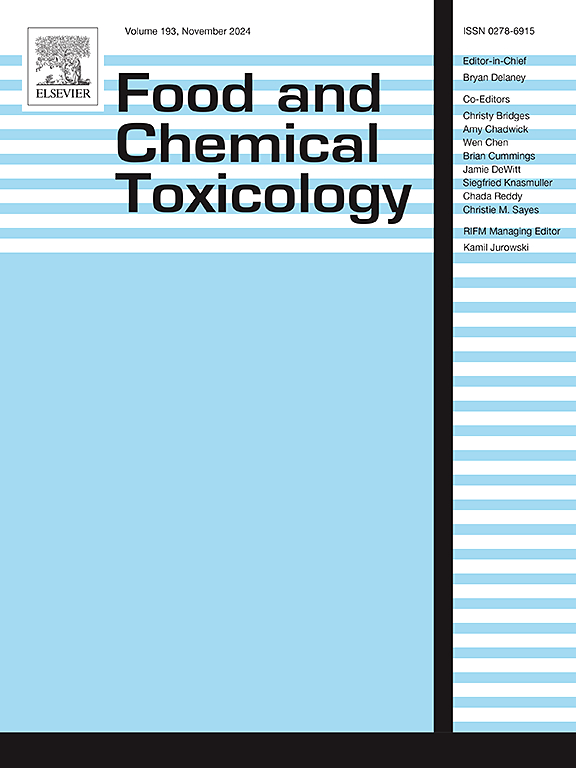PFOS promotes lung adenocarcinoma cell proliferation through PI3K/AKT/NF-κB mediated EMT
IF 3.5
3区 医学
Q2 FOOD SCIENCE & TECHNOLOGY
引用次数: 0
Abstract
Perfluoroalkyl and polyfluoroalkyl substances (PFASs) are synthetic chemicals widely used in consumer and industrial sectors, with PFOS being particularly notable for its extensive applications. However, PFOS exposure has been associated with health issues, and while its biotoxicity—especially carcinogenic effects—has been documented, the specific risks and mechanisms in lung cancer remain unclear. This study investigates the effects of PFOS on lung adenocarcinoma (LUAD) cell lines and elucidates its carcinogenic mechanisms. We evaluated PFOS-induced proliferation in H1299 and A549 LUAD cells, focusing on its anti-apoptotic properties and impact on epithelial-mesenchymal transition (EMT), while also examining activation of the PI3K/AKT/NF-κB pathway and its role in apoptosis inhibition. Results show PFOS significantly promotes H1299 and A549 cell growth via anti-apoptotic effects, accelerates EMT in LUAD cells to enhance migration, and activates the PI3K/AKT/NF-κB pathway to facilitate proliferation and migration. These findings suggest PFOS exposure may exacerbate pre-existing lung conditions or induce carcinogenesis by suppressing apoptosis and activating PI3K/AKT/NF-κB signaling, providing evidence for PFOS-related carcinogenic potential in LUAD.
PFOS通过PI3K/AKT/NF-κB介导的EMT促进肺腺癌细胞增殖
全氟烷基和多氟烷基物质是广泛用于消费和工业部门的合成化学品,其中全氟辛烷磺酸的广泛应用尤其引人注目。然而,全氟辛烷磺酸暴露与健康问题有关,虽然其生物毒性——尤其是致癌作用——已被记录在案,但肺癌的具体风险和机制仍不清楚。本研究探讨了全氟辛烷磺酸对肺腺癌(LUAD)细胞系的影响,并阐明其致癌机制。我们评估了pfos诱导H1299和A549 LUAD细胞的增殖,重点关注其抗凋亡特性和对上皮-间质转化(EMT)的影响,同时研究了PI3K/AKT/NF-κB通路的激活及其在细胞凋亡抑制中的作用。结果显示PFOS通过抗凋亡作用显著促进H1299和A549细胞生长,加速LUAD细胞EMT增强迁移,激活PI3K/AKT/NF-κB通路促进增殖和迁移。这些研究结果表明,PFOS暴露可能通过抑制细胞凋亡和激活PI3K/AKT/NF-κB信号通路,加重原有肺部疾病或诱发癌变,为PFOS在LUAD中的致癌潜力提供了证据。
本文章由计算机程序翻译,如有差异,请以英文原文为准。
求助全文
约1分钟内获得全文
求助全文
来源期刊

Food and Chemical Toxicology
工程技术-毒理学
CiteScore
10.90
自引率
4.70%
发文量
651
审稿时长
31 days
期刊介绍:
Food and Chemical Toxicology (FCT), an internationally renowned journal, that publishes original research articles and reviews on toxic effects, in animals and humans, of natural or synthetic chemicals occurring in the human environment with particular emphasis on food, drugs, and chemicals, including agricultural and industrial safety, and consumer product safety. Areas such as safety evaluation of novel foods and ingredients, biotechnologically-derived products, and nanomaterials are included in the scope of the journal. FCT also encourages submission of papers on inter-relationships between nutrition and toxicology and on in vitro techniques, particularly those fostering the 3 Rs.
The principal aim of the journal is to publish high impact, scholarly work and to serve as a multidisciplinary forum for research in toxicology. Papers submitted will be judged on the basis of scientific originality and contribution to the field, quality and subject matter. Studies should address at least one of the following:
-Adverse physiological/biochemical, or pathological changes induced by specific defined substances
-New techniques for assessing potential toxicity, including molecular biology
-Mechanisms underlying toxic phenomena
-Toxicological examinations of specific chemicals or consumer products, both those showing adverse effects and those demonstrating safety, that meet current standards of scientific acceptability.
Authors must clearly and briefly identify what novel toxic effect (s) or toxic mechanism (s) of the chemical are being reported and what their significance is in the abstract. Furthermore, sufficient doses should be included in order to provide information on NOAEL/LOAEL values.
 求助内容:
求助内容: 应助结果提醒方式:
应助结果提醒方式:


